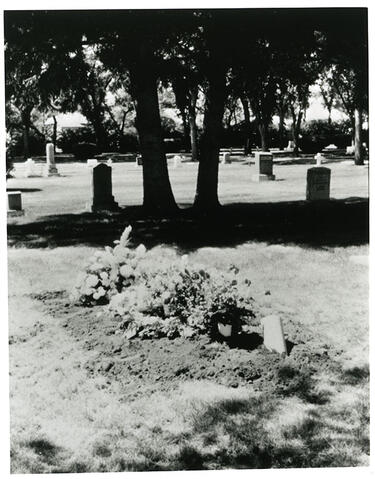
Zona do título e menção de responsabilidade
Título próprio
Richard St. Barbe Baker Grave
Designação geral do material
- Material gráfico
Título paralelo
Outra informação do título
Título e menções de responsabilidade
Notas ao título
Nível de descrição
Item
Entidade detentora
Código de referência
Zona de edição
Menção de edição
Menção de responsabilidade da edição
Zona de detalhes específicos de materiais
Menção da escala (cartográfica)
Menção da projecção (cartográfica)
Menção das coordenadas (cartográfico)
Menção da escala (arquitectura)
Autoridade emissora e denominação (filatélica)
Zona de datas de criação
Data(s)
-
[ca. 1982] (Produção)
Zona de descrição física
Descrição física
2 photographs : b&w ; 12.7 x 17.8 cm
Zona dos editores das publicações
Título próprio do recurso continuado
Títulos paralelos das publicações do editor
Outra informação do título das publicações do editor
Menção de responsabilidade relativa ao editor do recurso contínuo
Numeração das publicações do editor
Nota sobre as publicações do editor
Zona da descrição do arquivo
Nome do produtor
História custodial
Âmbito e conteúdo
Grave of Richard St. Barbe Baker at Woodlawn Cemetery, Saskatoon; trees and headstones in background.
Bio/Historical Note: Born 9 October 1889 near Southhampton, England, Richard Edward St. Barbe Baker was educated at Dean Close School, Cheltenham; Emmanuel College, University of Saskatchewan; and Cambridge University where he completed forestry studies. Following service in World War I, and a brief stint with the British civil service, Baker was appointed Assistant Conservator of Forests in Kenya. There in 1922 he founded the Men of the Trees, enlisting the help of 9,000 voluntary tree planters in an attempt to arrest the invading Sahara. This society, which grew into an international organization, became the central cause of Baker’s life. He became a renowned forestry consultant, and over the years was called upon to advise governments in many nations on forestry and conservation matters, including Palestine, New Zealand, the United States, Africa, and India. Baker also was active in promoting international co-operation and was involved in preparations for the first World Forestry Congress held in Rome in 1926. In addition to his extensive forestry and conservation activities, Baker wrote and published widely and has more than thirty books and scores of articles to his credit. While much of his writing is autobiographical in nature, he also wrote about tree, forestry and conservation concerns, spiritual and religious topics, health matters, and horses, and also produced some material specifically for children. Throughout Baker’s life he was in demand as a public lecturer, speaking to numerous audiences in many countries, and gave talks in schools all over Britain and New Zealand. Baker’s radio talks were featured on the BBC in Britain, and he was also heard on radio in the United States, New Zealand, Australia, Canada, and Africa. Beyond his forestry and literary activities, he was strongly involved with the Baha'i Faith, and was a proponent of healthful living. He received an honourary Doctor of Laws degree from the University of Saskatchewan in 1972, and in 1977 the Order of the British Empire was bestowed upon him. In 1959 Baker lived in New Zealand until his death on 9 June 1982 in Saskatoon while visiting the University of Saskatchewan. He was 92 years old.

